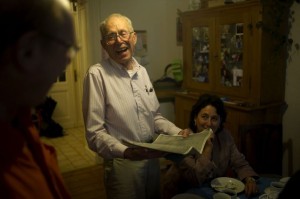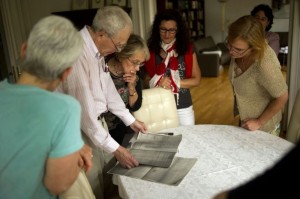NOTE: I first wrote this post several months ago, shortly after our family trip in May to Dad’s hometown in Germany.

Edward Lowenstein looks at documents at 22 Alte Zeilen. First floor owner Dirk Fuchs is on left. (Photo courtesy of Jon Lowenstein)
Sometimes four words can reveal a universe.
In this case, they were written at the end of a treasured gift given to us by Dirk Fuchs, who resides with his wife and younger son reside on the first floor at 22 Alte Zeilen in the Steele neighborhood of Essen.
The home used to belong to my great-grandfather and namesake Joseph Lowenstein.
Like Jews throughout the country, Papa Joseph endured the gradually and incessantly constricting clutches of the Nazi regime that stripped him of the medical license he had worked so hard to earn. Instead, he was called a “medical practitioner.”
For a while, he was allowed to operate only on Jewish patients.
Later in the 1930s, he was not permitted to practice at all.
Joseph’s son Ernie was also a doctor. Family legend has it that Joseph’s four sons had a remarkably brief career-decision process. Their father pointed to two of them and told them they would be lawyers. The other two would be doctors.
This is precisely what happened.
“One didn’t disobey one’s parents,” Ernie told me years later while living in a retirement facility in Evansville, Indiana.
Ernie, who was in his mid-20s and did not have a family, responded by leaving the country, eventually serving in the United States Army and working for close to half a century as a country doctor in Mt. Carmel, Illinois. Papa Joseph, however, decided to stay.
He did so because he was older.
He did so because he had known no other country and believed that Germany was his land.
He did so because, as the Lowenstein patriarch, he felt duty-bound not to leave as long as there was another family member in the country.
Of course, this sense of obligation had its own snaring effect as the next generation also would not leave as long as their parents were alive.
I remember years later visiting my great aunt Ilse at her apartment in Queens, New York. A highly intelligent woman who studied with Karl Jaspers and earned her PhD. from the University of Heidelberg in 1931, Ilse told me she knew she had to leave Germany in 1929. That was the year when one of her professors discovered that he was one-quarter Jewish and killed himself in the town square.
But she didn’t depart until eight years later, after her husband Eric, my grandmother’s brother, had buried his parents.
Had they waited even one year longer, I might never have been conceived. For it was Ilse who signed the affidavit that first permitted my grandparents, and then my father, to have an entry point in the United States.
For his part, Joseph stayed despite the persistent entreaties of Mr. G., a patient, Gentile and friend.
The owner of a print shop, Mr. G. wrote the death card marking the passing of my great-grandmother Clara in 1931. He saw the ominous and lethal direction in which the country was headed and implored his former physician to leave.
Joseph refused.
Unable to make a living, his financial situation worsened, we can only assume.
So in 1939, he decided to sell the three-story yellow home in which he had lived and worked.
His son Rudolf, also a doctor, had moved into the home with his family because he too could not make a living.
This brings us to Mr Fuchs, who now lives in the home.
A civil servant, he spent a month in which he went through three city deparments, calling in favors all along the way, to procure a copy of the bill of sale.
He presented the document to us on May 29, 2012.
He gave it to us at the kitchen table, which was filled with plates, tea cups, saucers and an exquisite array of homemade cakes and pastries baked with inordinate care and tenderness by his wife Susan.

The dining room table on the first floor of Joseph Lowenstein’s former home in Essen, Germany. Edward Lowenstein had had his appendix removed on the kitchen table in the same floor the last time he had been in the house more than 73 years earlier. (Photo courtesy of Jon Lowenstein, NOOR)
It was Dad’s 78th birthday and the first time he had been in the house in 73 years.
The last time had been under far less hospitable conditions.
He was having his appendix removed on Papa Joseph’s kitchen table.
His father Max, a World War I veteran, had taken his ailing son from doctor to doctor throughout the town where our family had lived for close to 150 years.
None would operate on a Jewish child.
This time, though, could not have been more different.
In addition to giving Dad the bill of sale, Dirk also gave the building’s original floor plans and a piece of plaster that Susan had discovered while they were doing some work on the bathroom. She said she had to save it for Dad.

Edward Lowenstein looks at documents about his family presented to him by the owner of the first floor of his grandfather’s former home in Essen, Germany. (Photo courtesy of Jon Lowenstein, NOOR)
Like so many documents from the Hitler regime, the bill of sale looks ordinary enough.
It details the date of sale and, after the war, the recipients of the 3,000 Deutschmarks a half-dozen members of our family received in reparations to terminate our claim on the building.
It also identifies the buyer, a butcher in town, and the price of 19,000 DM he paid for the stately building that, at least when we saw it, was largely covered with ivy.
But in the sale, after the price and before the reparations, comes a curious phrase.
It says that Papa Joseph, Rudi and his family can stay in the house until they “Carry out their emigration.”
At first glance, the clause seems to be a generous gesture of a purchase by an area merchant to a well-liked, yet increasingly marginalized community member.
But a deeper look uncovers other aspects of the document and its contents.
The first is the assumption of an emigration.
This is curious on a number of levels. The most basic is that, as I mentioned earlier, for much of the Nazi reign during which they lived, neither Papa Joseph nor Rudi wanted to leave the country.
We learned years later that Papa Joseph eventually heeded his friend’s advice and sought to leave.
He walked around the town of Essen with an English dictionary seeking to gain proficiency in the language he would need to speak when he landed in the United States, the country where his oldest son had been able to settle.
Joseph never made it.
Rudi, too, ultimately changed his mind and tried to depart from Germany.
But it was too late for him and his family, too.
Beyond our family members’ individual desires, the ability of any Jews to emigrate at the dawn of the Second World War was severely limited-a fact which makes the verb “carry out” more than a little curious.
While it is true that Joseph’s oldest son Max and his daughter-in-law Hilde, my father’s parents, escaped through Genoa, Italy in 1940, they were rare exceptions to an increasingly restrictive policy.
Another point: The purchase took place after the so-called period of Aryanization began.
The late Holocaust scholar David Bankier once talked about the circles of involvement within German society in regards to the Nazi Party.
Just 10 percent of the population belonged to the Party, he said.
But many other people who were not Nazis supported it by participating in the Aryanization of the country.
This happened in 1938.
It consisted of German non-Jews purchasing businesses and homes from Jews at the proverbial dirt cheap prices with little, if any, room, for dissent from the sellers.
Seen in this context, the purchase appears far from a magnanimous gesture, but rather to be another step in the degradation and later destruction of Papa Joseph and our family in particular, and the Jewish people in general.
This idea gains currency when one considers that the part of the phrase that said our family could remain in the house until they carried out their emigration did not turn out to be true.
Eventually, Joseph was forced to move from his home to a house where many Jews were placed before being deported and killed.
Joseph understood the fate that awaited him.
In an effort to preserve what precious family materials he could, he turned to Mr. G., the former patient who had please with my great-grandfather to leave when could.
Shortly before his deportation, Joseph visited his former patient and friend, the Jewish family Bible in tow.
He had received the Bible, which contained vivid illustrations by Gustav Doré, to mark the occasion of his and Clara’s 25th wedding anniversary.
On the front page, written in careful German script, was our family tree stretching back through the 20th and 19th centuries before settling in the late 18th century, when the Lowensteins first arrived in Steele.
He also asked Mr. G. to hold about two dozen literary classics, works by authors like Shakespeare and Goethe.
The man consented.
Shortly thereafter, my great-grandfather was forced to board a train “headed for the East.”
We don’t know where he died – I looked once in the archives at Yad Vashem and it only said, “Izbica,” a Polish town – and have heard everything from Theresienstadt to Treblinka to Auschwitz from family members over the years.
Even more important, perhaps, than the precise location where the genocidal regime ultimately ended Papa Joseph’s life, is the coded meaning within four simple words: “Carry out their emigration.”
Taken by law-abiding citizens and under the guise of a transaction between equals, the purchase of the house at Alte Zeilen did not lead directly to Papa Joseph’s killing.
But it was an important part of that process.
We did not have the opportunity to meet the butcher’s descendants to hear their side of the story.
But the honor and decency with which Mr. G. acted means that other Germans like him had a choice, that their actions were not inevitable, and thus some judgment of what happened is possible.
Mr. G.’s actions raise a painfully tantalizing question: how might history have turned out if more Germans had had the moral compass and willingness to act as he did, rather than the anonymous butcher who bought our family’s house?
We will never know, of course.
But we can take from that unrealized possibility a reminder not only to take moral actions ourselves, but to work ceaselessly with others to ensure the social fabric and consensus is to protect, rather than prey on, our most vulnerable members.
That can take few words, too.
